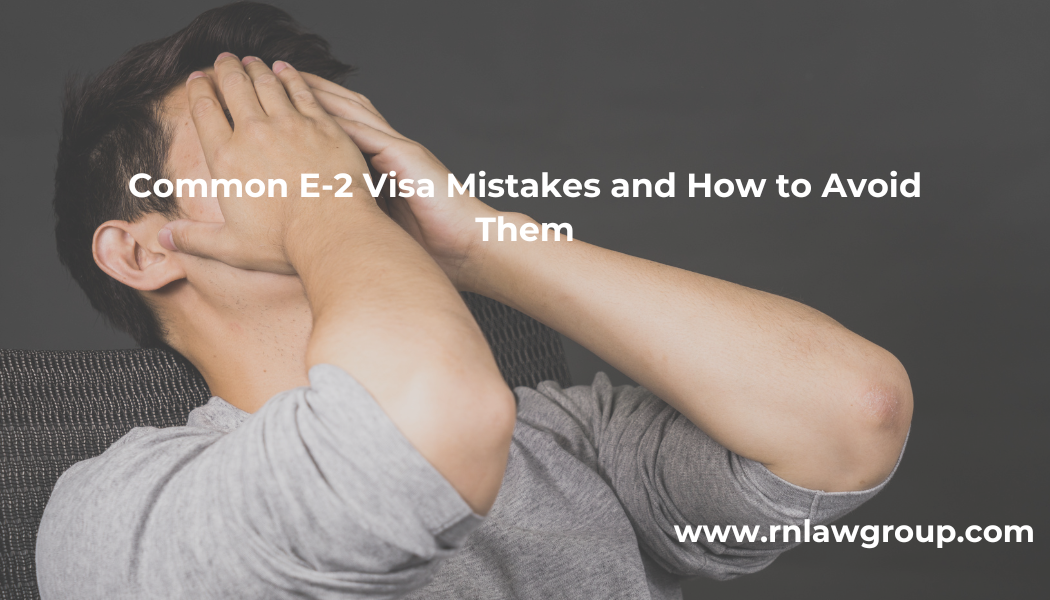
Common E-2 Visa Mistakes and How to Avoid Them
The E-2 Treaty Investor Visa is a valuable immigration option for entrepreneurs and investors from treaty countries who wish to live and work in the United States by investing in and managing a U.S.-based business. This nonimmigrant visa is especially appealing to small business owners, startups, and solo entrepreneurs because it does not require a specific investment minimum and can be renewed indefinitely.
However, despite its benefits, the E-2 visa process is far from straightforward. Many applicants face challenges that can delay or even derail their plans—often due to avoidable mistakes. This article outlines the most common pitfalls E-2 applicants encounter and provides practical tips for avoiding them.
1. Not Verifying Treaty Country Eligibility
The Mistake:
Assuming you are eligible for the E-2 visa without verifying whether your country of citizenship qualifies.
The E-2 visa is only available to nationals of countries that have a treaty of commerce and navigation with the United States. Not all countries are on this list, and dual nationals must apply under a passport from a treaty country.
How to Avoid It:
Check the official list of E-2 treaty countries published by the U.S. Department of State. If you are not a national of a treaty country, you will not be eligible for the E-2 visa—even if your investment and business meet all other requirements.
If your home country is not eligible, consider whether you qualify for an alternative visa. An immigration attorney can help assess the best options based on your nationality and immigration goals.
2. Underestimating the Investment Requirement
The Mistake:
Believing that any amount of investment qualifies as “substantial.”
The law does not specify a fixed dollar amount for E-2 investment, which leads to confusion. Instead, the investment must be “substantial” in relation to the total cost of purchasing or establishing the business and must be sufficient to ensure its successful operation.
How to Avoid It:
As a general rule, the smaller the business, the higher the percentage of total capital that must be invested. For example, if your business requires $100,000 to operate, investing $85,000 may be considered substantial—but investing $20,000 would likely not meet the standard.
You should:
- Clearly document your investment with bank statements, receipts, contracts, and wire transfer confirmations.
- Demonstrate that the funds are “at risk,” meaning they are irrevocably committed to the business and could be lost if it fails.
- Avoid counting passive investments or funds held in escrow with unrelated conditions.
If capital is limited, consider using personal loans (secured by personal assets), lawful gifts, or third-party financing that does not burden the business itself.
3. Ignoring the Marginality Requirement
The Mistake:
Planning a business that only supports the investor, with no plan to hire U.S. workers.
U.S. immigration law requires that the E-2 business not be “marginal.” A marginal enterprise is one that does not have the capacity to generate more than minimal living income for the investor and their family or is not projected to create jobs for U.S. workers.
How to Avoid It:
You should:
- Include a detailed five-year hiring plan in your business plan, outlining anticipated positions, salaries, and timelines.
- Demonstrate how the business will grow and contribute to the U.S. economy.
- Keep payroll records, tax filings, and W-2s to verify job creation during renewals.
Even if your business is a startup or solo venture at first, showing a credible plan to hire within the first two years is essential for approval and long-term visa maintenance.
4. Failing to Plan for Renewals
The Mistake:
Assuming the E-2 visa is a one-time process and failing to prepare for ongoing compliance.
The E-2 visa is typically granted for up to two years at a time, though some treaty countries allow for longer validity periods. While it can be renewed indefinitely, renewals are not automatic and require updated evidence that the business remains active and compliant.
How to Avoid It:
Stay organized and prepare for renewals by:
- Keeping updated financial records, tax filings, and employee documentation.
- Maintaining a clean compliance history (e.g., no unauthorized employment or immigration violations).
- Starting the renewal process at least three to six months before the visa’s expiration.
- Consulting an immigration attorney to review your documentation and ensure the business still qualifies.
A lapse in compliance or failure to renew on time can lead to status loss and jeopardize your ability to continue operating in the U.S.
5. Misunderstanding Dependent Work Rights
The Mistake:
Assuming that spouses and children can work without additional authorization.
Under the E-2 visa, the principal investor can bring a spouse and unmarried children under 21 as dependents. However, only spouses are eligible to work in the United States.
How to Avoid It:
Children on E-2 status cannot work and must transition to another visa category, such as an F-1 student visa, before turning 21 if they wish to remain in the U.S.
Ensure you plan early for the child’s age-out date, especially if they are close to 21.
6. Weak Documentation and Interview Preparation
The Mistake:
Submitting a poorly organized application or being unprepared for the consular interview.
E-2 visa approval is heavily document-driven, and consular officers may deny applications if they find inconsistencies, vague business plans, or insufficient evidence of investment.
How to Avoid It:
Prepare a thorough and consistent visa package that includes:
- A credible, realistic five-year business plan
- Source of funds documentation
- Proof of actual investment (e.g., invoices, wire transfers, contracts)
- Lease agreements and proof of business operations (e.g., website, utilities, invoices)
- Articles of incorporation, bank statements, and payroll records
Before the interview, rehearse your answers to common questions about your business operations, investment details, and future plans. Consistency between your application and what you say during the interview is critical.
Conclusion
The E-2 visa offers a flexible and powerful option for investors to live and work in the United States. However, the path to approval and long-term success requires thoughtful planning, attention to detail, and ongoing compliance.
By avoiding common mistakes such as ignoring eligibility rules, underestimating the investment threshold, overlooking job creation requirements, or failing to prepare for renewals, applicants can greatly improve their chances of success.
Whether you’re applying for the first time or preparing for a renewal, working with an experienced immigration attorney can help you build a strong application, avoid pitfalls, and stay compliant with U.S. immigration law.
By: Felipe Jimenez
Felipe Jimenez is an Associate Attorney at Reddy Neumann Brown PC. He works in the Non-Immigrant Visa (NIV) Department where he assists clients through all phases of the non-immigrant visa process.
Reddy Neumann Brown PC has been serving the business community for over 20 years and is Houston’s largest immigration law firm focused solely on US. Employment-based immigration. We work with both employers and their employees, helping them navigate the immigration process quickly and cost-effectively.

